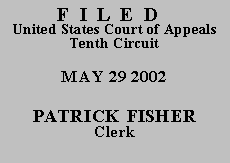

| UNITED STATES OF AMERICA,
v.
MARK HOLBROOK |
98-CR-239-C)
|
Petitioner Mark Holbrook entered a plea of guilty on one count of manufacturing methamphetamine in violation of 21 U.S.C. § 841(a)(1). His conviction was affirmed on direct appeal. United States v. Holbrook, 2000 WL 807478 (10th Cir. 2000). He now seeks a certificate of appealability (COA) to pursue his appeal of the district court's denial of his petition for a writ of habeas corpus filed pursuant to 28 U.S.C. § 2255. Determining that Mr. Holbrook has not met the statutory requirements, we deny his application and dismiss the appeal.
We first note that pro se complaints are held "to less stringent standards than formal pleadings drafted by lawyers." Haines v. Kerner, 404 U.S. 519, 520-21 (1972). To be entitled to a COA, Mr. Holbrook must make "a substantial showing of the denial of a constitutional right." 28 U.S.C. § 2253(c)(2). He can make this showing by establishing that "reasonable jurists could debate whether (or, for that matter, agree that) the petition should have been resolved in a different manner or that the issues presented were adequate to deserve encouragement to proceed further." Slack v. McDaniel, 529 U.S. 473, 484 (2000) (quotation omitted).
We may grant habeas relief only if the state court entered a judgment that
(1) resulted in a decision that was contrary to, or involved an unreasonable application of, clearly established Federal law, as determined by the Supreme Court of the United States; or
(2) resulted in a decision that was based on an unreasonable determination of the facts in light of the evidence presented in the State court proceeding.
28 U.S.C. § 2254(d).
When considering a habeas petition, we are barred from considering claims that are not raised on direct appeal, absent a showing of cause and prejudice, or a miscarriage of justice. United States v. Allen, 16 F.3d 377, 378 (10th Cir. 1994). To the extent Mr. Holbrook might show cause by demonstrating that he received ineffective assistance of counsel, we conclude that Mr. Holbrook did not receive ineffective assistance of counsel for substantially the reasons set forth by the district court. To the extent that Mr. Holbrook might demonstrate a miscarriage of justice by showing actual innocence, we agree that such a claim is without merit for substantially the reasons articulated by the district court.
The application for a certificate of appealability is therefore DENIED. The motion to proceed in forma pauperis is granted.
ENTERED FOR THE COURT,
Deanell Reece Tacha
Chief Circuit Judge
*.This order and judgment is not binding precedent, except under the doctrines of law of the case, res judicata, and collateral estoppel. This court generally disfavors the citation of orders and judgments; nevertheless, an order and judgment may be cited under the terms and conditions of 10th Cir. R. 36.3.